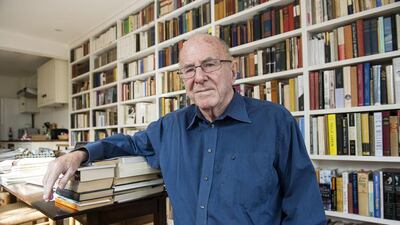Australian broadcaster and author Clive James has died at the age of 80 after a long illness, his agent has said.
The popular writer was diagnosed with leukaemia in 2010 and passed away at his home in Cambridge, England on Sunday.
A private funeral was held on Wednesday and attended by family and close friends.
“Clive died almost 10 years after his first terminal diagnosis, and one month after he laid down his pen for the last time," said his manager, United Agents.
"He endured his ever-multiplying illnesses with patience and good humour, knowing until the last moment that he had experienced more than his fair share of this ‘great, good world’.”
James had a long and ultimately unsuccessful operation in February to remove a cancer in his cheek, which left him frail and almost blind, his website said.
He had leukemia and emphysema diagnosed, and suffered kidney failure in 2010.
"I am a man who is approaching his terminus," James said in 2012.
But he continued to broadcast until this year and only gave up on writing last month.
The poet, essayist, author and entertainer had a gift for tickling the divergent sensibilities of the readers of highbrow literary magazines and the audiences of Saturday night TV in Britain, his adopted country.
James was treasured for his comic gift, learned literary criticism and deep love for the written word.
In one of his best-remembered book reviews, he said an official Soviet biography of President Leonid Brezhnev as so dull that: "If you were to recite even a single page in the open air, birds would fall out of the sky and dogs drop dead."
James, in his self-deprecating way, once imagined an acquaintance describing him as "the boy from the bush who could quote Wittgenstein".
He was born in 1939 in the Sydney suburb of Kogorah. He was an only child whose father survived a Japanese Second World War prison camp only to die on the flight home, when his son was 6.
James said he had no memory of his father but he looked back on the death and his mother's despair as the defining moments of his life.
"I understood nothing except that I could not help," he wrote in Unreliable Memoirs, the first of five autobiographical volumes.
"Eventually in my mid-30s I got a grip on myself. But there can be no doubt that I had a tiresomely protracted adolescence, wasting a lot of other people's time, patience and love."
Christened Vivian after the Australian tennis star Vivian McGrath, James won permission from his mother to choose an unequivocally masculine name.
He picked Clive from the character played by Tyrone Power in the 1942 film This Above All.
A scholarship for war orphans paved his way to Sydney University, for which James claimed to be unprepared.
But he read hungrily, contributed to the school's literary journal and became its editor.
After a stint at the Sydney Morning Herald, James left for Britain and Cambridge University.
He was already bridging the worlds of academia and showbiz, and served as president in 1966-67 of the Footlights.
The university club spawned stars including Peter Cook, Jonathan Miller, Hugh Laurie, Emma Thompson, Stephen Fry, Germaine Greer, John Cleese, Graham Chapman, Eric Idle and Sacha Baron Cohen.
Despite academic success, he fell into depression in his 20s.
"The proof that I was getting ready to jump off a cliff or stick my head in an oven, that I was serious, was that I was giving my books away," he told the Financial Times in 2007.
"It was largely because I was lost, I had no outlets and I wasn't expressing myself. I wasn't doing what keeps me stable now, which is having a stage and a platform."
One of a number of famous Australians in Britain at the time, James went on to become a big name in British television and radio in the 1980s.
As an author and critic, he was influential in media circles as he won awards for journalism and broadcasting.
His often coarse, dead-pan style peaked in popularity in the 1980s with the show Clive James on Television, in which he lampooned clips of absurd international TV shows, in particular a Japanese contest called Endurance.
As comfortable writing about low-brow as he was with intellectual culture, his self-deprecating book of memoirs was a bestseller reprinted dozens of times.
James's book Cultural Amnesia, comprising short essays about more than 100 people who fascinated him, testified to the breadth of his cultural and intellectual interests.
They included writers Thomas Mann and Franz Kafka, filmmaker Federico Fellini and musicians from Duke Ellington to Erik Satie.

